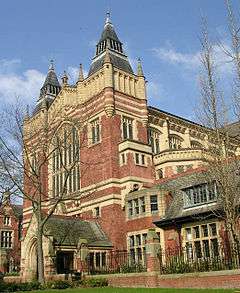Leeds International Piano Competition
| Leeds International Piano Competition | |
|---|---|
 Leeds Town Hall in 2006 | |
| Awarded for | Exceptional piano performance |
| Location |
Great Hall of the University of Leeds Leeds Town Hall |
| Country |
|
| Presented by | Leeds International Piano Competition |
| First awarded | 1963 |
| Website | http://www.leedspiano.com/ |
The Leeds International Piano Competition, informally known as The Leeds and formerly the Leeds International Pianoforte Competition,[1] takes place every three years in Leeds, West Yorkshire, England. It was founded in 1961 by Marion, Countess of Harewood, Fanny Waterman, and Roslyn Lyons, with the first competition being held in 1963. Waterman was the chair and artistic director up to the 2015 competition. The competition takes place in the Great Hall of the University of Leeds and in Leeds Town Hall.
History

The competition was first held in September 1963. It joined the World Federation of International Music Competitions (WFIMC) in 1965.[1] After the 1996 competition, there was a four-year break before the 2000 competition, to coincide the next edition with the turn of the millennium. Competitors were formerly housed at Tetley Hall, a residence hall at the University of Leeds, which closed in 2006. For many years, the supervisor of Tetley Hall during the competition was Elizabeth Arnold.
Sofya Gulyak, placed first in the 16th competition of 2009, was the first female top prize winner.[2] An Orchestra Prize, awarded to one of the six finalists, was introduced in 2012.
Waterman was the competition's chair and artistic director until her retirement after the 2015 event. She was replaced as artistic director by Paul Lewis (who will chair the jury from 2018) and Adam Gatehouse, with Mark Wingate taking over as chief executive and Linda Wellings as operations manager.[1][3]
Several changes were announced for the 2018 competition. The preliminary round of the competition will take place in Berlin, New York and Singapore, and will occur in April, five or six months ahead of the main competition. The semi-finalists will give two different recitals. A chamber music round will also be introduced. The concerto round will be reduced to five finalists, who will play two concertos, one "classically oriented"[4] and one from the Romantic period or later. Three main prizes will be awarded, and an audience prize will be introduced, which will be voted for online. The prize benefits will include an offer of mentoring by Lewis and other pianists for multiple competitors, as well as a management package with Askonas Holt for one of the three top-placed finalists. Medici.tv will stream all rounds on the internet. Masterclasses, talks, educational events and other activities will also be included in the competition.[3][4]
Orchestra
Since 2003, the competitors have been accompanied by the Hallé Orchestra, under the leadership of Mark Elder. Previous partnerships include the City of Birmingham Symphony Orchestra under Simon Rattle (1987–2000), the BBC Philharmonic with Vernon Handley in 1984 and the Royal Liverpool Philharmonic with Charles Groves (1963–1975).
Prize winners
*Winner of the Terence Judd–Hallé Orchestra Prize.[5][6]
See also
References
- 1 2 3 http://www.wfimc.org/Webnodes/en/Web/Public/Competitions/Competition+info?org=16625
- ↑ Andrew Clements (14 September 2016), "Leeds International Piano competition final – first prize for Anna Tcybuleva, not the obvious choice", The Guardian, retrieved 3 January 2017
- 1 2 'New Vision' announced for 2018 Competition, Leeds International Piano Competition, 18 October 2016, retrieved 2 January 2017
- 1 2 Paul Lewis (18 October 2016), "Paul Lewis: how we're transforming 'the Leeds' to nurture tomorrow's pianists", The Guardian, retrieved 2 January 2017
- ↑ James McCarthy (18 September 2012), "Leeds International Piano Competition 2012 Winner Announced", Gramophone, retrieved 3 January 2017
- ↑ Heejae Kim piano, Leeds International Piano Competition, 5 April 2016, retrieved 3 January 2017